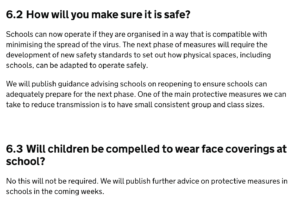Well, at least one outfit is doing well in this crisis
Source: Axios
Tuesday 12 May
What do you do when you have a government like the UK’s?
Boris Johnson has spent his entire life behaving irresponsibly — and getting away with it. When the threat of the Coronavirus was already obvious to his advisers, he continued to behave irresponsibly — not just in maintaining the virus-spreading environment of government meetings in the claustrophobic atmosphere of 10 Downing Street, but also — as the Sunday Times has revealed — in effectively going AWOL to Chequers in order to sort out the chaos of his personal life and negotiate a divorce from his cancer-struck former wife at a time when the virus was spreading and his scientific advisers were trying to sound an alarm.
Then he gets the virus and nearly dies. Whereupon he emerges from the ordeal and sings a paen of praise to the NHS staff who saved his life. At which point he is valorised as a hero by the tabloid newspapers. But even a detached observer might be entitled to hope that the PM’s near-death experience might have changed his spots and transformed an Etonian joker into a grown-up human being.
Sadly, that looks like a vain hope. The ‘strategy’ Johnson and his government have now outlined for easing the lockdown is a masterpiece of pious, internally-contradictory fatuity.
This isn’t just my opinion, btw. “If we follow Boris Johnson’s advice, coronavirus will spread” says David Hunter, who is professor of epidemiology and medicine at the University of Oxford.
The key words in Boris Johnson’s speech on Sunday were “you should go to work if you can’t work from home”. He made no mention of preparations for tracing and testing contacts of people who test positive for Covid-19. In the plan published today, a newly appointed test and trace taskforce will begin to develop such a system.
The countries that have succeeded in taming their coronavirus epidemics – such as South Korea, Taiwan, China, Australia and New Zealand – differ from the UK in many ways. But they all have in common “test, trace, isolate” as the centrepiece of their strategy.
The UK government claims to be “following the science”, but it seems the science now needs to catch up with a government that is prioritising concerns about economic damage over epidemic control. The economic damage is clear, and the lockdown will also have knock-on health effects due to unemployment, domestic abuse, and postponed diagnoses and treatments. But if science is the rationale, why not level with the public and show the data that suggests the return to work is now the lesser evil? If there is evidence from modelling that social distancing while at work or commuting – rather than sheltering at home – is sufficient for virus control, let us see it.
And here’s the Oxford economist Simon Wren-Lewis on “why we can’t restart Britain’s economy until we get coronavirus under control” While deaths continue, he argues (rightly), most people will stay at home out of choice, whatever the government does.
Once people have confidence that the number of cases are very low and well controlled, they will leave their homes, they will happily send their children to school and they will travel to work. The economy can almost fully recover, although it may still be necessary to ban large social gatherings. South Korea’s TTI regime is so good that it decreased the number of cases without the need for the first-stage lockdown, but countries such as the UK, with less experience of TTI, should not be so ambitious.
A well functioning TTI regime, together with restrictions on overseas travel, is therefore the solution to how we get from here to when a vaccine is developed with as few deaths as possible, and with as little damage to the economy as possible. This is why there is no conflict between opening up the economy and saving lives.
What about those demanding a quicker end to the lockdown to “save the economy”? They seem to be making a simple error, says Wren-Lewis.
Without a government-imposed lockdown the economy would not return to normal. With minimal measures to contain the pandemic and therefore many new cases each day, most people will stay at home and keep their children at home out of choice. Nearly all academic economists understand that you cannot restart the economy without getting the virus under control.
What’s astonishing is that the UK government still doesn’t seem to get this. There’s no way out of this crisis without a working TTI (test, trace and isolate) system. And it’s only now that it’s assembling a ‘Taskforce’ to design it while apparently putting its faith in a smartphone contact-tracker app to get it through the next few weeks. And yet, as John Thornhill pointed out in the FT the other day,
The experience of some Asian countries, struck by the pandemic earlier than Europe, is that contact-tracing apps are only useful when they form part of an integrated public health response with rigorous testing regimes. Effective contact tracing depends on a small army of human interviewers who can contextualise electronic encounters.
Contact tracing, in other words, is a human activity. And the UK is apparently just getting started on it.
The government’s new ‘guidance’ document
Some bits of it are truly weird. For example:
Now imagine you’re a head-teacher reading this. June 1 is 15 working days away from today. You are having to reconfigure your school for social distancing etc. So what advice does the government offer on that? Ah, here it is.
This is typical of the entire document. “We will publish”…”We will publish”… “We will publish…”
Mass immunity is a fantasy; ditto mass testing — at least for the time being
As noted above, efficient, large-scale mass testing is a key requirement for a safe re-booting of the economy. But that kind of testing facility doesn’t exist yet, as this story from today’s FT suggests:
The mass testing that is central to lockdown exit plans in many countries is unrealistic because of high costs and lack of production capacity, according to the boss of an Italian biotech company that supplies tests around the world.
Carlo Rosa, chief executive of DiaSorin, which sells Covid-19 diagnostic and antibody tests, said demand far exceeded supply and the percentage of people who had contracted the virus globally was too low to hope for mass immunity as another way out of restrictive lockdown measures.
“Catching the virus in its early stage is the only solution but it works to the extent unlimited tests are available and you can immediately isolate and trace the positives; antibody tests help track asymptomatic patients and provide some information about protection,” Mr Rosa told the Financial Times. “But tests today are linked to complicated and expensive molecular technologies . . . and the demand is much higher than the offer.”
DiaSorin is working to develop a faster and cheaper salivary swab test.
“It would be easier to use and produce in hundreds of millions of samples,” said Mr Rosa. “The challenge is making it as accurate as existing tests but based on a simple technology.”
Yeah, one day…
Quarantine diary — Day 52
This blog is also available as a daily email. If you think this might suit you better, why not subscribe? One email a day, delivered to your inbox at 7am UK time. It’s free, and there’s a one-click unsubscribe link if you decide your inbox is full enough already!



